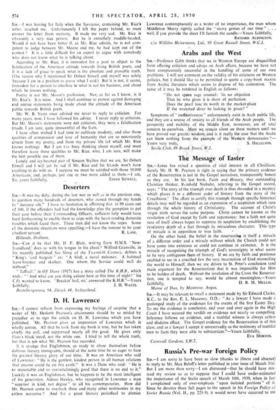Russia's Pre-war Foreign Policy
SIR.—I am sorry to have been so slow (thanks to illness and absence) to 'reply to Mr. Max Belofi's letter published in your issue of March 31st. But I am more than sorry—I am distressed—that he should have mis- read my review so as to suppose that I could have under-estimated the importance of the Stalin speech of March 10th, 1939, when in fact I complained only of over-emphasis "upon isolated portions" of it. Since he devotes three full pages to the speech in his Foreign Policy of Soviet Russia (Vol. 11., pp. 221-3), it would never have occurred to me
that anyone could have supposed this complaint, still less any suggestion of " irresponsibility," to be levelled at him.
Mr. Beloff is, of course, our leading authority on Soviet foreign policy, with which I am only conc:rnecl--rather timidly—from the point of view of some of Russia's neighbours. His letter, however, reminds me of a point about which I should be particularly grateful to learn his view. The " isolated portion " of the Stalin speech which I have most often seen quoted is that which mocks at the West for having hoped hat the Ukrainian question knight bring about a German attack upon the U.S.S.R. By this time Stalin surely knew what Hitler had told Csaky and Beck in, I believe, the previous January, that the Fiihrer had decided to give up his Great-Ukrainian campaign in Ruthenia ? Was not this decision a German gesture to Russia rawer than to Hungary or Poland, Ind if so is it possible that the much-quoted portion of the speech of March 10th was pronounced, five days before the Germans occupied Bohemia and finally abandoned Ruthenia to the Magyars, as some•kind of response, perhaps even a reminder ? I tentatively raised this question in 1939 on p. 237 of my Undeclared War (to which Mr. Beloff is kind enough to refer in his Vol. II quoted above) and have ever since been waiting for the answer—Yours faithfully, ELIZABETH WISK E M ANN. 42 St. George's Square, S.W.I.











































 Previous page
Previous page